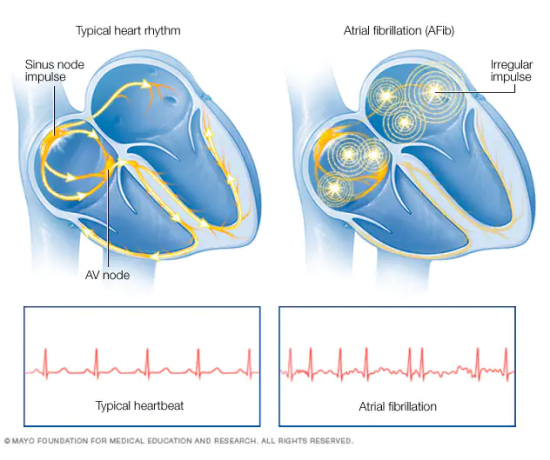Think of a time when your heart felt out of sync. That is a glimpse into Atrial Fibrillation, or Afib. It is more than a skipped beat. It is a serious arrhythmia that increases your stroke and heart failure risks. But what unfolds inside your heart during Afib? Spotting your heart's odd signals early might just save you from significant health woes.
What Happens During Atrial Fibrillation?
Afib is an odd beat pattern starting in your heart's upper parts, the atria. It messes with the normal electric pulses, leading to a chaotic rhythm and weak blood flow to the lower parts, the ventricles.
Afib is common, with over 33 million people over 55 years facing it globally. Many people with AFib opt for atrial fibrillation ablation in Chennai as a remedial measure to prevent this arrhythmia and its complications.
This arrhythmia comes in types like paroxysmal Afib, which may stop independently, and others that stick around longer, needing care. Catching Afib early means better odds of dodging strokes and heart failure.
Symptoms of Atrial Fibrillation- What Patients Experience
Afib symptoms vary. Some feel nothing early on. Others get tired, sense an odd pulse, feel dizzy, short of breath, or chest pain. Some patients may find out during a checkup without prior clues.
Some people may complain about erratic heartbeats, tiredness, dizziness, or chest discomfort. Some feel a flip-flopping heart during activities or when resting. Hearing from Afib patients paints a picture of its daily impact. These stories show Afib's effects on life, from physical to mental stress.
Stay sharp to how you feel and seek help when in doubt. Your symptoms guide your Afib care, so share them with your doctor.
The Mechanism of Atrial Fibrillation During an Episode
During an Afib episode, your heart's electric signals go haywire. The atria quiver instead of beating right, messing up your heart’s rhythm and blood flow.
This can lead to bigger heart issues. Knowing this helps you see why catching Afib symptoms and getting help is vital.
Atrial Fibrillation Risk Factors and Prevalence
Afib risks include age, high blood pressure, heart disease, excessive alcohol intake, and family history.
Knowing these risks helps you talk to your doctor about your heart. Afib hits some ethnicities more, like Europeans, and can lead to worse troubles, like strokes, in others.
Atrial Fibrillation Treatment and Management
With Afib, you will want to manage your heart’s rate and rhythm. Doctors may give you beta-blockers, calcium channel blockers, or digoxin for rate control. They may recommend blood thinners to stop clots and lower stroke risks.
For rhythm, you might need a shock to reset it or a procedure like atrial fibrillation ablation to block bad signals.
Medications &Otther Treatments for Atrial Fibrillation Rate & Rhythm Control
To manage Afib, your doctor will consider medications to control your rate and minimise stroke risks. They will weigh the pros and cons of blood thinners with you.
For Afib, your doctor may suggest a shock to reset your rhythm or a procedure to block bad signals if medications are not enough.
Emergency Help for Atrial Fibrillation- When to Act
Know when to seek urgent help for Afib. Signs like bleeding, severe pain, vision loss, or trouble moving need fast action.
Support and Resources for Living with Atrial Fibrillation
Having Afib can be tough. However, connecting with others facing the same issue can help. Therefore, look for support groups for tips and emotional backing. Afib is tricky but manageable with the right care. Stay informed, watch for symptoms, and work with your healthcare team.
Talk to your cardiac electrophysiologist in Chennai for a personalised treatment plan to manage and alleviate your AFib symptoms. Always prioritise your cardiac health. Never take it for granted.

